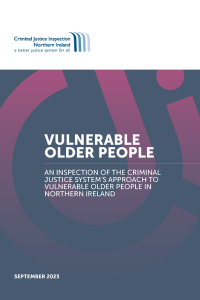
An Inspection of the Criminal Justice System's Approach to Vulnerable Older People in Northern Ireland
In Northern Ireland, the journey through the criminal justice system can involve significant challenges for vulnerable older people.
The Chief Inspector of Criminal Justice in Northern Ireland has highlighted these obstacles, shedding light on the issues faced by the elderly as they navigate the criminal justice system. The challenges referenced in this Inspection report looking at the criminal justice system’s approach to Vulnerable Older People in Northern Ireland prompted a call for tailored responses and a more focused approach from criminal justice organisations.
Demographic Snapshot
Northern Ireland is a relatively safe place to live where older people are less likely to become victims of crime compared to other age groups, but we are an ageing population. Approximately 23% of the population is aged 60 or above
[1], in the middle of an economic crisis with an increase in criminal offences and significant delays in our criminal justice system.
Vulnerable older people who are the victim of, or witness to a crime need to be properly supported to give their best evidence and participate in a prosecution that is progressed with a sense of urgency.
Understanding the barriers
This is the first time CJI has inspected this specific issue, examining the various stages of the victim's journey within the criminal justice system. The inspection and accompanying
press release identified wide-ranging barriers that vulnerable older people encounter which can relate to their family situation, physical mobility limitations, conditions that may affect thinking and reasoning like dementia, or broader life circumstances such as isolation or housing challenges.
Tailored Support for Vulnerable Older People
The central recommendation arising from this inspection revolves around the need for criminal justice organisations to recognise and respond to the unique needs and circumstances of vulnerable older people. Rather than assuming capabilities solely based on age, the emphasis is on tailored support that addresses individual challenges and ensures their effective participation within the criminal justice process.
Concerns raised
Case progression delays
One pressing concern that emerged is the impact of delays on the progression of cases involving vulnerable older individuals. These delays can hinder their ability to provide the best evidence at a later stage during the case or at court. CJI Chief Inspector Jacqui Durkin stressed the necessity for criminal justice organisations to expedite cases involving vulnerable older people, ensuring that their evidence is presented promptly.
Challenges to giving evidence
Inspectors have recommended that within the next 12 months, the
Police Service of Northern Ireland (Police Service) should work with colleagues in
the Public Prosecution Service (the PPS) to develop and implement an action plan to improve the ability of vulnerable older victims of crime to give their best evidence and enable their cases to move through the criminal justice system faster, speeding them up where appropriate.
This could involve considering greater use of video recorded interviews as evidence for cases involving vulnerable older people, where a person’s age or condition such as dementia, may prevent them from giving their best evidence at a later time during the case or at Court.
Domestic abuse
We know that feeling safe and being safe are not the same things and that sometimes home is not a safe place for an older vulnerable person. In the last 13 years, the number of domestic abuse crimes reported by victims aged 60 and over has increased by 447% from 251 crimes in 2007-08 to 1,373 crimes during 2021-22.
Given the rise in the reporting of these types of offences and significant levels of victim attrition in domestic abuse cases and the likelihood of a victim disengaging in a domestic abuse case, we have recommended
the Public Prosecution Service (PPS) should include age as a criterion in its processes for ensuring cases involving domestic abuse or a domestically motivated crime are dealt with to an acceptable standard.
Older vulnerable people are also often reliant on those closest to them to manage their finances and personal care needs appropriately in their best interests and it can be very difficult for them to raise concerns about those who they should be able to trust the most, particularly when they are isolated.
Recognising Positive Initiatives
The report acknowledges the positive initiatives undertaken by the
Police Service alongside partner organisations on crime prevention and personal safety as well as innovations that recognised the impact of cognitive conditions such as Alzheimer’s disease and other types of dementia.
While these education campaigns are valuable, Inspectors have recommended that, in the next six months the Police Service should identify further opportunities to develop public awareness of the
QuickCheck and
Banking Protocol fraud prevention schemes.
Inspectors also found that the Police Service was the only criminal justice organisation with a specific strategy in place for older people and other organisations needed to improve the focus on older people in their policies.
Inspectors also recommended the
PPS should continue to work with the
Commissioner for Older People in Northern Ireland to better reflect the needs of older people in its policies, particularly the
Victim and Witness Policy and associated internal guidance for Prosecutors.
Conclusion
This Inspection shines a light on the intricacies of the challenges faced by vulnerable older people in Northern Ireland's criminal justice system.
We encourage engaging with Northern Ireland’s criminal justice organisations to improve how vulnerable older people are seen and heard to build trust and confidence in our criminal justice system.
By recognising the unique needs of this demographic and implementing tailored responses, criminal justice organisations have an opportunity to improve criminal justice outcomes for vulnerable older people.
[1] NISRA, Census 2021 main statistics demography tables – age and sex, MS-A02 Age - five year age bands – all usual residents,
September 2022 available at https://www.nisra.gov.uk/system/files/statistics/census-2021-ms-a02.xlsx.